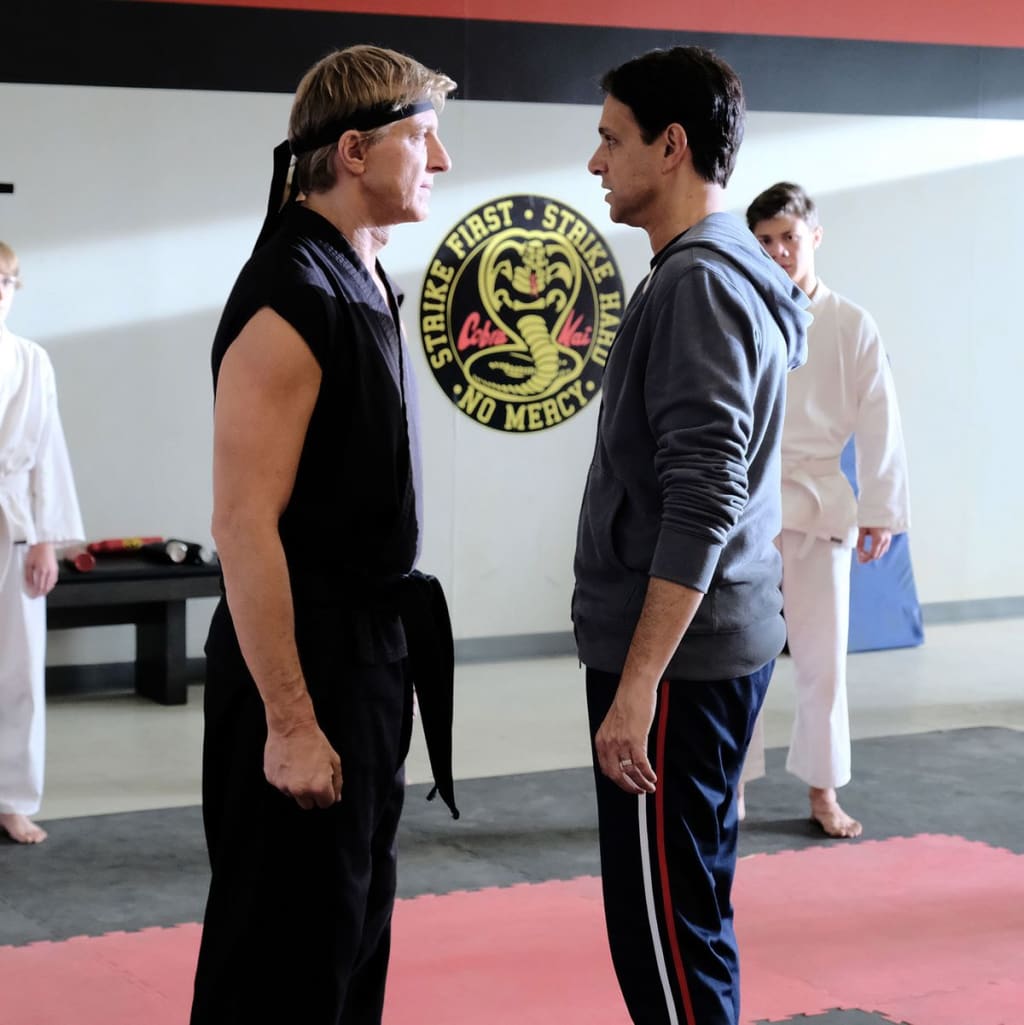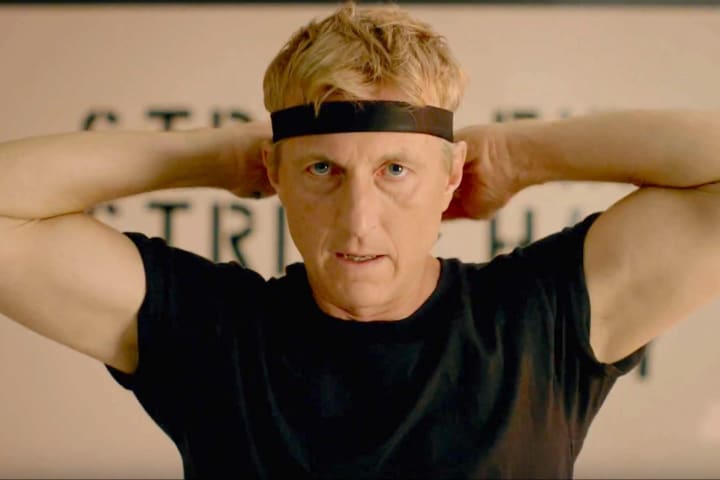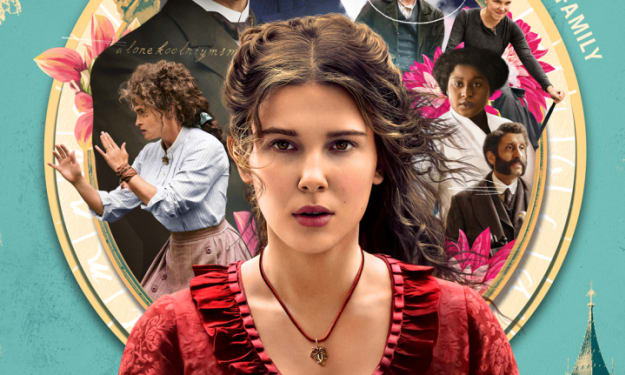Why You Should Watch “Cobra Kai” on Netflix
A deeper, more complex “Karate Kid” for the new generation... but with a dash of 80s cheese.

“The Karate Kid” came out in 1984, 3 years before I was even born. It was still popular enough while I was growing up that I was aware of its existence but I can’t even remember when I finally sat down to watch it. It left no lasting impression on me. Which is why I was a bit surprised to find myself somewhat charmed by its most recent sequel - a series titled “Cobra Kai”, the first two seasons of which are currently streaming on Netflix.
What is “Cobra Kai”?
“Cobra Kai” premiered in 2018 as a YouTube original but has now been acquired by Netflix. It stars Ralph Macchio and William Zabka reprising their roles as Danny LaRusso (the protagonist of the original movies) and Johnny Lawrence (his old nemesis). As neither actor is currently the biggest Hollywood name out there, some may see the series as a desperate attempt to rekindle past glory and milk an old cash cow. I don’t feel like that’s the case. Based on what I’ve seen from the two of them, both on and off screen, this project was undertaken with a lot of love, self-awareness and good humour. And you know what else? I think they might actually have something to say to the new generation.
The story takes place 34 years after the ending of “The Karate Kid”. Former school bully Johnny is now a middle-aged loser who is lonely, grumpy and often drunk. He’s estranged from his son and doesn’t seem to have any friends. His predicament probably comes as no surprise to anyone who watched the first movie back in the 80s - after all, bullies are supposed to end badly (although I seem to remember young Johnny having some redeeming qualities). But the twist is that this, ladies and gentlemen, is our new protagonist.
Spurred on by nostalgia, hatred for his once-rival Danny LaRusso and the encouragement of a nerdy high-schooler named Miguel who wants to learn karate, Johnny decides to become Miguel’s sensei and resurrect his old dojo Cobra Kai. This decision proves a little “triggering” for Danny who immediately associates Cobra Kai and Johnny himself with bullying, dirty fighting and corrupting the youth of their lovely town. And thus, the rivalry between them begins anew.

How corny is it?
Well… quite corny. But that’s not necessarily a problem here.
I think part of the show’s charm is that it isn’t ashamed of its 80s cheesiness - it owns it. It doesn’t care if you laugh at it or think it’s lame. It relies on the idea that an engaging cast can make silly tropes feel epic - and, for the most part, they do!
The story uses stock characters - the (improbably good-looking) nerd who learns how to be a badass, the quirky friends, the pretty daughter of a rival family who is tailor-made to be a love-interest, the jaded and unwilling mentor… And yet, somehow, these characters feel just genuine enough to rise above the label “clichés” and earn the more charitable title “archetypes”. My favourite is probably “the sensible wife”, embodied in this case by Danny’s spouse Amanda (Courtney Henggeler). She takes nobody’s bullshit, has some great lines and might be the only truly reasonable adult around.
With all of that said, if you are expecting a simple old-fashioned tale about an underdog rising to the top, or maybe one of those ever-so-popular retellings of famous stories where the villain turns out to be the hero (like Maleficent but with more karate)... well, you might be in for something a little more complex.
Caution: You may hate yourself for loving Johnny.

This grown-up Johnny Lawrence starts out unapologetically sexist, juvenile, petty and violent... but also undeniably sympathetic. He wants to do better, he just clearly doesn’t know how. He breaks social norms, he insults people (when he’s not punching them) and he flies in the face of political correctness. And yet, I’ll be damned if that’s not exactly what makes him an enjoyable protagonist!
Johnny is a rebel who can do a lot of good or a lot of damage, depending on how his energy is focused. We are sometimes drawn to characters like this not because we are bad people who like assholes but because deep down we understand that, no matter what the status quo, there will always be a need for people who challenge it. We also, hopefully, haven’t completely lost our sense of empathy. We realise that, while Johnny is not always the good guy, he’s also not a bad guy. He’s just a guy who is trying his best. He does one thing right and five things wrong every time he tries to solve a problem. He ends up bullying his students and accidentally pushing them towards becoming bullies themselves, but his advice to them isn’t wholly bad - it just gets taken too far. His “tough love” approach might not be suitable for everyone and it may require a lot of fine-tuning but that doesn’t mean it’s worthless.
One notable example involves a timid boy with a scar on his lip whom Johnny constantly addresses as “Lip”, much to everyone’s dismay. The lesson which Johnny is (albeit inelegantly) trying to teach is about acknowledging your shortcomings rather than hiding from them and about working to become something beyond what people immediately judge you for. Of course, verbally harassing someone is not a good thing but, in this case, the confrontation works in everyone’s favour. The student himself is obviously incredibly preoccupied with his facial defect. Johnny encourages him to “flip the script” and to find something else for everyone to focus on if he doesn’t want to always be seen as “Lip”. This is not bad advice and, initially, has a positive effect. “Lip” chooses to craft a new “badass” persona for himself, which earns him the much more desirable nickname “Hawk”, along with a better social life and Johnny’s genuine appreciation and approval. You could argue that he shouldn’t have to change his appearance or behaviour to be respected but I would argue back that you can’t completely erase the way humans naturally relate to one another. Confidence will always be attractive and we will always respond to certain outward signs of it. In addition, “faking it” does sometimes help you “make it”. Stepping out of your comfort zone can lead you to discover qualities you didn’t know you possessed.

Of course, towards the end of the first season we see Hawk, along with other Cobra Kai students, stray too far into “aggressive jackasses” territory (to Johnny’s belated regret) but that doesn’t negate the good that’s been done up to that point. It just shows that finding balance is difficult and often requires a lot of zigzagging.
What about Danny?
I was initially afraid that Danny LaRusso would be painted as a straight-up antagonist, which would have been rather lazy. But the series does not try to do away with previous history or completely rewrite the personalities of its characters to make the story work. It simply delves a little bit deeper into their psychology. Danny is now the owner of a successful car dealership but being harassed at school as a child has clearly left him with some permanent insecurities. He’s very defensive of the respect he’s earned in the community and often behaves as though bullies are still waiting to attack him at every corner. In front of Johnny he comes off as unbearably smug, but in front of his family he is an embarrassingly overprotective parent with a chip on his shoulder. Throughout the first season he gradually becomes more likable and unknowingly bonds with Johnny’s son whom Johnny himself has not been able to reconnect with. By the end of season one, we are truly unsure whom we are supposed to be cheering for.

The good thing about this kind of narrative is that it teaches young people to be both forgiving and critical of the adults in their lives, as well as their peers. In “Cobra Kai” - and in the real world - there is no such thing as a perfect role model. There are both good and harmful messages in what most people say and do. It’s better to learn how to distinguish between them and argue when we disagree, rather than entirely disengaging from the conversation every time we are in conflict. With “cancel culture” being such a big thing these days, I think this is an important lesson to learn. “Cobra Kai” allows its characters to be flawed and, occasionally, even somewhat unfit for the expectations of the 21st century, while still acknowledging their goodness and without completely condemning them as people.
Does this show glorify violence?
The entire philosophy of the series is that you shouldn’t back down from a fight. So is the goal to promote aggression? On the surface, the messages may seem somewhat controversial to a modern audience. “Cobra Kai” dares to suggest that maybe violence is not never the answer; that maybe every once in a while kids (and adults) do need to give each other a few scrapes and bruises before everyone can be friends. You can be outraged but the truth is, deep down we all believe that kicking ass is okay when there is something worth fighting for - otherwise superhero movies wouldn’t be so popular. It’s figuring out where to draw the line that’s really the problem - and that’s the issue that “Cobra Kai” is trying to talk about.
The show does not advocate for a return to a more violent, sexist or otherwise harmful culture from decades ago. It just acknowledges that, in our desire to get away from the negative side of our past, we might be losing something along the way. Maybe some things of value can be found among the rubble. The characters are constantly trying to marry old and new, with everyone both learning and teaching valuable lessons to each other.

In conclusion...
You will, no doubt, laugh at this show, at its drama, corniness and plot contrivances. But, chances are, you will also laugh with it - at the humanity of its characters, at your own nostalgia and at how much you guiltily enjoy its schoolboy violence. Check it out!
About the Creator
Yana Aleks
Fiction writer, reviewer and an incurable chatterbox.






Comments
There are no comments for this story
Be the first to respond and start the conversation.